How has a year of Covid-19 and lockdown transformed the way we buy, own and raise our pets?
It’s been just over a year since the nation first entered lockdown in March 2020. Since then, pet ownership has exploded – with millions more households discovering the joy that owning a pet brings. In a major survey, we looked at the changing trends in pet ownership as well as the impact of the pandemic pet boom on animal charities and vets.
The pandemic pet boom
Over the course of the pandemic, a quarter of pet owners we surveyed welcomed a new pet into their home. Dogs were the most popular new addition, closely followed by cats. For almost half of these owners (47%) this was their first pet, and new pets were most popular with Londoners and 18-34-year-olds.
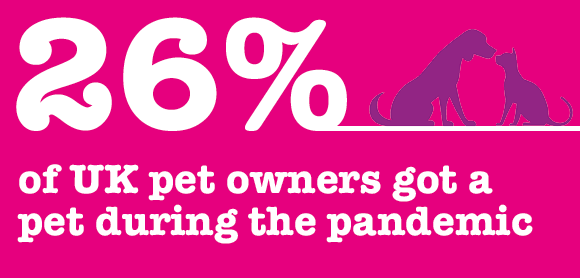
Over a third of new owners said that the pandemic was a factor in them getting their new pet. In fact, corresponding with the first few months of lockdown there was a clear increase in the number of people searching online for puppies, kittens and rabbits for sale in 2020 compared to 2019, with a peak over April, May and June 2020.
The main reasons people gave for getting a new pet during the pandemic were:
- More time spent at home
- Ability to work from home
- The desire for companionship
Pets made lockdown bearable
There’s no doubt that owning a pet has made a huge difference to many people during the tough months of lockdown. A whopping 85% of new pet owners we surveyed found that having a pet significantly helped them during the pandemic – with the most common benefits being companionship, helping with mental health and encouraging exercise.
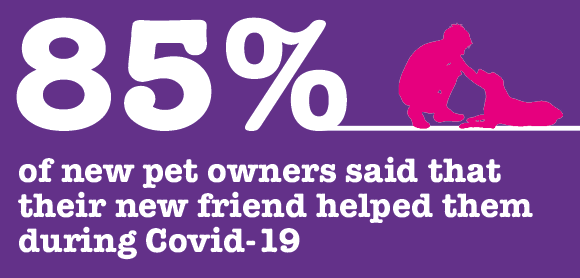
But as restrictions begin to ease will new pet owners still feel capable of caring for their pets? A quarter of owners said they already had some regrets about taking on a new pet, with the most common worries cited being the cost of pet ownership, potential health problems and the time needed to care for them.
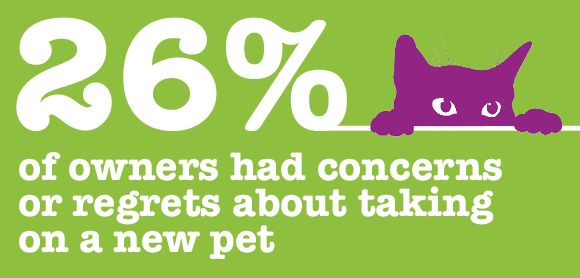
We also found that 40% of new pet owners are concerned about balancing pet ownership with the easing of lockdown. The most common concerns relate to pet theft, disruption when they return to work and pets developing separation anxiety.
For owners that may have concerns about their lockdown pet purchase, there is plenty of support from animal charities, vets and other pet professionals – and for families still considering adding a pet to their home, there’s a lot to think about, including the potential rise in pets being abandoned.
A mixed picture for charities
Just over half of owners thought that the number of pets being abandoned since the beginning of the pandemic had increased. The good news is that this public perception doesn’t necessarily tally with the numbers being reported by charities and shelters – for the moment at least.
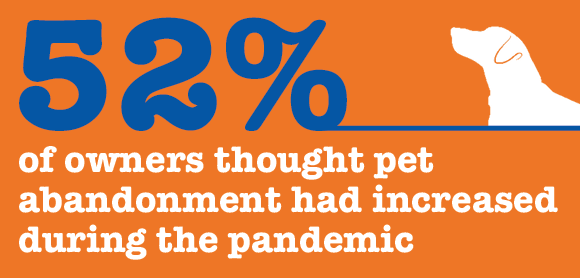
The Edinburgh Dog and Cat Home found that their intake of abandoned pets was down approximately 35% from 2019. They said: ‘This indicates that loving pets are remaining in loving homes.’ However, like many charities they do have concerns around a potential wave of abandonment in the future.
In a recent article for Petplan, Andrew Gillon, Director of Operations at the National Animal Welfare Trust, said: ‘A lot of new puppies have not been properly health-checked – when the first big vet bill comes along, potentially those dogs could be given up.’ Leigh-Anne Howson, from the charity SSPCA, told us: ‘We’re definitely concerned. We don't want this massive influx of poor animals being abandoned in a few months’ time, when people realise the full impact of having a pet.’
The pandemic has also had an impact on income for animal charities, who were forced to quickly adapt their fundraising and adoption processes to comply with lockdown regulations. Of the pet owners we surveyed, 59% thought that donations to pet charities have decreased, while 43% were worried that families wanting to rehome a pet wouldn’t be able to visit them in the shelter.
But many charities did successfully rehome pets during lockdown, albeit with different procedures. Rehoming applications moved online and “hands-free” processes allowed families to meet potential new pets. The Edinburgh Dog and Cat Home told us that while ‘this was a challenge initially, this process means our staff can now dedicate more time to the care of the dogs and cats onsite.’ The upshot is that they feel they’re now more successful at finding the right forever home for the animals in their care.
Vets under strain
Veterinary practices have also been under huge pressure during lockdown. Trying to balance staff shortages and additional safety measures with the influx of new registrations has pushed many veterinary staff to the limit. Vets weren’t classed as essential workers by the Government, creating additional challenges such as childcare for many.
Tegan, a Registered Veterinary Nurse (RVN) said: ‘Working in a veterinary practice over Covid-19 has to be one of the hardest things I’ve done. Due to furlough, remaining team members were required to muck in wherever possible. RVNs became receptionists, cleaners, medication runners and car park attendants as well as doing all their usual day to day tasks.’
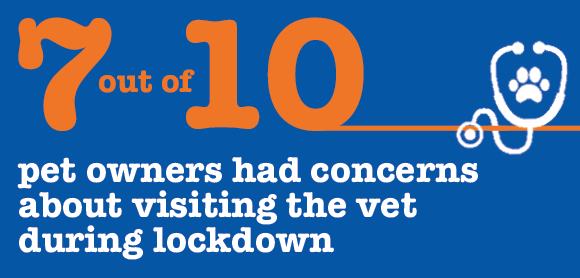
Many pet owners felt anxious about the new procedures and not being able to go with their pet into the consult room. In our survey seven out of ten pet owners who had to visit a vet during lockdown had concerns relating to these visits.
However, pet owners can rest assured veterinary professionals are doing their best to deliver the same high standards of care as usual, even under challenging circumstances.
A new future for pet ownership
It’s clear that pets have been a lifeline to many over lockdown, offering companionship and comfort as we navigate our way through challenging times.
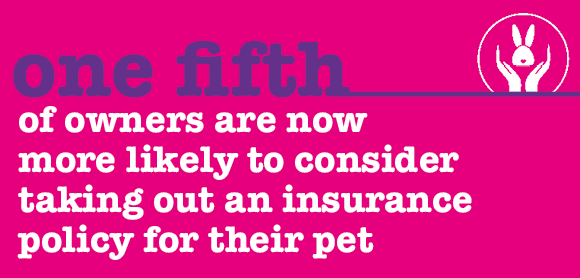
And it is encouraging to see that one in five pet owners are now more likely to consider taking out pet insurance for their pet; to help cover the cost veterinary care.
While we can’t be sure what the future will hold, our findings show that the future for pet ownership, and for the vets and animal charities that care for our pets, will continue to evolve.